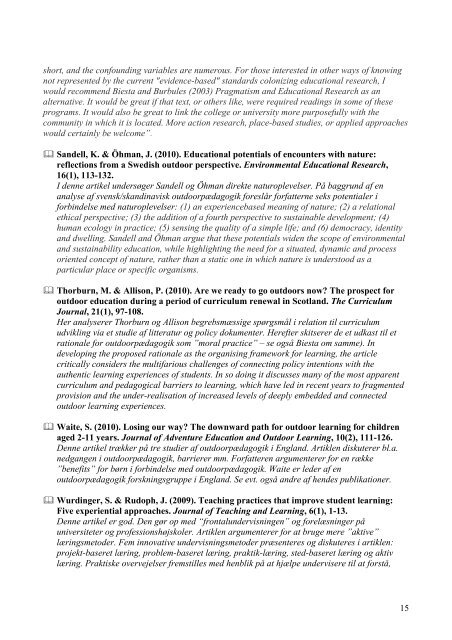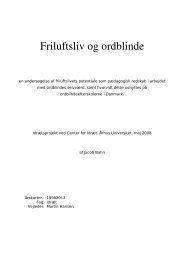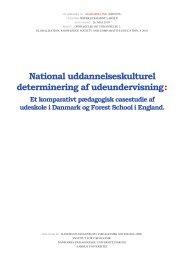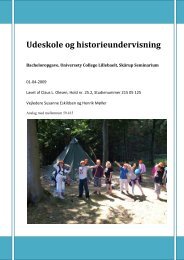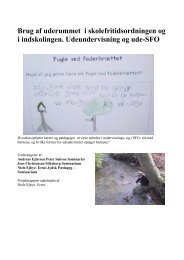Kommenteret bibliografi om outdoorpædagogik ... - Udeskole.dk
Kommenteret bibliografi om outdoorpædagogik ... - Udeskole.dk
Kommenteret bibliografi om outdoorpædagogik ... - Udeskole.dk
You also want an ePaper? Increase the reach of your titles
YUMPU automatically turns print PDFs into web optimized ePapers that Google loves.
short, and the confounding variables are numerous. For those interested in other ways of knowing<br />
not represented by the current "evidence-based" standards colonizing educational research, I<br />
would rec<strong>om</strong>mend Biesta and Burbules (2003) Pragmatism and Educational Research as an<br />
alternative. It would be great if that text, or others like, were required readings in s<strong>om</strong>e of these<br />
programs. It would also be great to link the college or university more purposefully with the<br />
c<strong>om</strong>munity in which it is located. More action research, place-based studies, or applied approaches<br />
would certainly be welc<strong>om</strong>e”.<br />
Sandell, K. & Öhman, J. (2010). Educational potentials of encounters with nature:<br />
reflections fr<strong>om</strong> a Swedish outdoor perspective. Environmental Educational Research,<br />
16(1), 113-132.<br />
I denne artikel undersøger Sandell og Öhman direkte naturoplevelser. På baggrund af en<br />
analyse af svensk/skandinavisk <strong>outdoorpædagogik</strong> foreslår forfatterne seks potentialer i<br />
forbindelse med naturoplevelser: (1) an experiencebased meaning of nature; (2) a relational<br />
ethical perspective; (3) the addition of a fourth perspective to sustainable development; (4)<br />
human ecology in practice; (5) sensing the quality of a simple life; and (6) democracy, identity<br />
and dwelling. Sandell and Öhman argue that these potentials widen the scope of environmental<br />
and sustainability education, while highlighting the need for a situated, dynamic and process<br />
oriented concept of nature, rather than a static one in which nature is understood as a<br />
particular place or specific organisms.<br />
Thorburn, M. & Allison, P. (2010). Are we ready to go outdoors now? The prospect for<br />
outdoor education during a period of curriculum renewal in Scotland. The Curriculum<br />
Journal, 21(1), 97-108.<br />
Her analyserer Thorburn og Allison begrebsmæssige spørgsmål i relation til curriculum<br />
udvikling via et studie af litteratur og policy dokumenter. Herefter skitserer de et u<strong>dk</strong>ast til et<br />
rationale for <strong>outdoorpædagogik</strong> s<strong>om</strong> ”moral practice” – se også Biesta <strong>om</strong> samme). In<br />
developing the proposed rationale as the organising framework for learning, the article<br />
critically considers the multifarious challenges of connecting policy intentions with the<br />
authentic learning experiences of students. In so doing it discusses many of the most apparent<br />
curriculum and pedagogical barriers to learning, which have led in recent years to fragmented<br />
provision and the under-realisation of increased levels of deeply embedded and connected<br />
outdoor learning experiences.<br />
Waite, S. (2010). Losing our way? The downward path for outdoor learning for children<br />
aged 2-11 years. Journal of Adventure Education and Outdoor Learning, 10(2), 111-126.<br />
Denne artikel trækker på tre studier af <strong>outdoorpædagogik</strong> i England. Artiklen diskuterer bl.a.<br />
nedgangen i <strong>outdoorpædagogik</strong>, barrierer mm. Forfatteren argumenterer for en række<br />
”benefits” for børn i forbindelse med <strong>outdoorpædagogik</strong>. Waite er leder af en<br />
<strong>outdoorpædagogik</strong> forskningsgruppe i England. Se evt. også andre af hendes publikationer.<br />
Wurdinger, S. & Rudoph, J. (2009). Teaching practices that improve student learning:<br />
Five experiential approaches. Journal of Teaching and Learning, 6(1), 1-13.<br />
Denne artikel er god. Den gør op med “frontalundervisningen” og forelæsninger på<br />
universiteter og professionshøjskoler. Artiklen argumenterer for at bruge mere ”aktive”<br />
læringsmetoder. Fem innovative undervisningsmetoder præsenteres og diskuteres i artiklen:<br />
projekt-baseret læring, problem-baseret læring, praktik-læring, sted-baseret læring og aktiv<br />
læring. Praktiske overvejelser fremstilles med henblik på at hjælpe undervisere til at forstå,<br />
15


